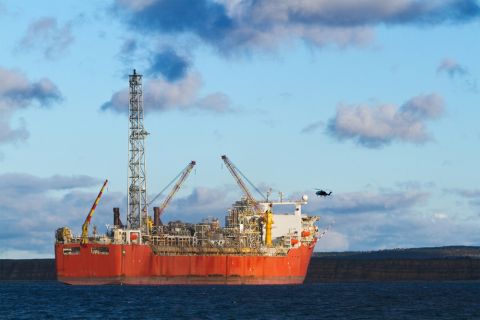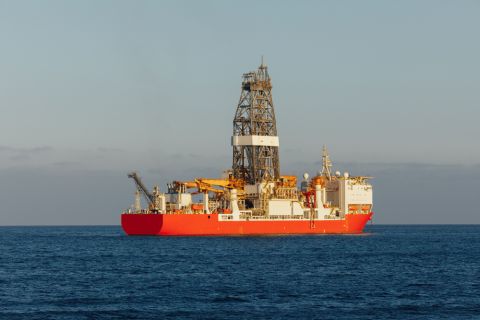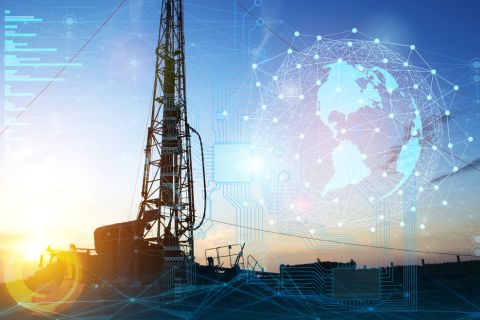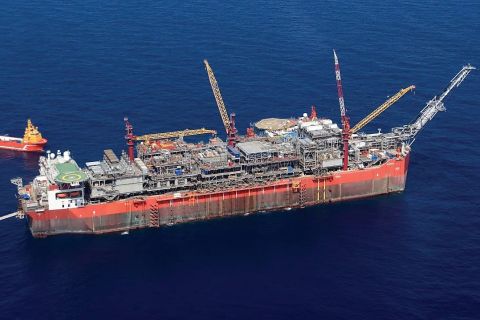Chevron Corp.'s first-quarter profit nearly quadrupled from the same period a year ago, easily surpassing Wall Street's forecasts as oil and gas prices surged following Russia's invasion of Ukraine.
The second-largest U.S. oil producer on April 29 posted adjusted earnings of $6.5 billion, or $3.36 per share, 8 cents above Wall Street's mean estimate of $3.27, according to Refinitiv. Chevron earned $1.7 billion, or 90 cents per share, in the same quarter last year.
The world's largest energy companies have profited handsomely on the back of rising oil and gas prices, which surged in February as Moscow planned its advance on Ukraine.
The global benchmark Brent averaged $114 per barrel in the first quarter. Energy supplies have tightened around the globe as demand has rebounded to near pre-pandemic levels.
Chevron's revenue rose 70% to $54.4 billion in the first quarter, above the Refinitiv consensus of $47.9 billion.
The producer is using its massive profit to raise investments in production and in renewable fuels, return cash to shareholders and pay down debt.
The company's U.S. oil and gas production rose by 10% from the year-ago period. Russia's output has dipped after the U.S. and allies imposed heavy sanctions on Moscow. The U.S. is the world's largest crude oil producer, but output has grown slowly in 2022 even as prices have increased.
In the first quarter, Chevron pumped a record of 692,000 bbl/d of oil and gas in the Permian, the top U.S. unconventional basin, and boosted full-year guidance to a range of 700,000 bbl/d to 750,000 bbl/d.
"Chevron is doing its part to grow domestic supply," Chevron's CEO Mike Wirth said in an earnings release.
The revenues from higher oil prices could be used to return cash to shareholders, expand Chevron's low-carbon business and pay down debt, CFO Pierre Breber told Reuters.
"First is the dividend. The second is investing in the business. Third is maintaining a balanced strong balance sheet. And then the fourth is returning excess cash to shareholders," he said.
Chevron earlier this year increased its dividend payments by 6% to $1.42 per share and increased its buyback program to $10 billion annually.
The company has the capacity to raise buybacks further, but Chevron is aiming at a level it can maintain when the oil industry goes through a downturn, Breber said.
"We have a very clear plan" to deliver high returns to shareholders while decreasing carbon emissions, Breber told Reuters by phone. "We continue to stay on this path."
Chevron plans to raise investments and acquisitions this year by more than 50% from 2021, which may include deals in lower-carbon ventures like natural gas and renewable fuels.
RBC Capital Markets said earlier this month that Chevron could be interested in buying a LNG facility on the U.S. Gulf Coast as it expands its natural gas business. The company declined to comment in speculations.
Chevron recently expanded its renewable fuels business by buying Renewable Energy Group and signed an agreement with agricultural giant Bunge North America. Its has also invested in hydrogen, carbon capture and offsets businesses, with plans to build 30 hydrogen fueling stations in California.
Chevron's shares were down 0.5% to $161 in premarket trading.
Recommended Reading
TotalEnergies Starts Production at Akpo West Offshore Nigeria
2024-02-07 - Subsea tieback expected to add 14,000 bbl/d of condensate by mid-year, and up to 4 MMcm/d of gas by 2028.
Tech Trends: SLB's Autonomous Tech Used for Drilling Operations
2024-02-06 - SLB says autonomous drilling operations increased ROP at a deepwater field offshore Brazil by 60% over the course of a five-well program.
Seadrill Awarded $97.5 Million in Drillship Contracts
2024-01-30 - Seadrill will also resume management services for its West Auriga drillship earlier than anticipated.
Well Logging Could Get a Makeover
2024-02-27 - Aramco’s KASHF robot, expected to deploy in 2025, will be able to operate in both vertical and horizontal segments of wellbores.
Remotely Controlled Well Completion Carried Out at SNEPCo’s Bonga Field
2024-02-27 - Optime Subsea, which supplied the operation’s remotely operated controls system, says its technology reduces equipment from transportation lists and reduces operation time.





